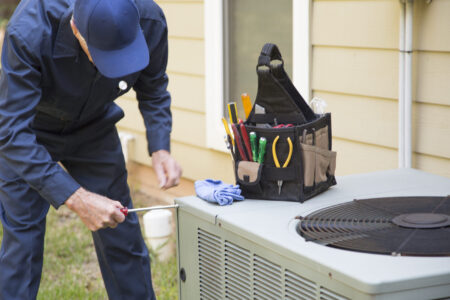
Ensuring you choose the ideal air conditioner for your home is critical to keeping your interior spaces comfortable during a scorching summer. However, comfort isn’t the only factor. This piece will explore the strengths of different AC types and other factors you should consider.
Traditional Central Air Conditioning
Traditional central air conditioners are the type that you most commonly find in homes. A network of ducts runs through your home that the air conditioner uses to distribute air in your rooms. The primary components of these systems include an outdoor compressor, ductwork, and an indoor evaporator coil.
Pros and Cons
Traditional air conditioning systems are great at maintaining a comfortable and consistent temperature in large homes or spaces. You can pair these systems with a furnace for both central heat and air in your home.
A drawback of these systems is that they require extensive ductwork to be installed if your home doesn’t already have it. Air ducts can also develop leaks over time, reducing their energy efficiency over time.
Ductless Mini-Split Systems
Ductless mini-split systems have a smaller outdoor unit. However, unlike traditional units, no ducts must be installed in the home. Instead, you’ll have small, interior blower units in different parts of the home. Refrigerant lines connect each of these interior units to the primary outdoor unit.
Pros and Cons
Many mini-split systems can both cool and heat a home without the need for an external furnace. The installation is less intrusive than traditional air conditioners due to the lack of ductwork. Ductless mini-splits are also known for high energy efficiency. Because you have interior units around the home, each can be independently controlled for temperature and airflow, making it a “zone control” system.
A downside is that ductless mini-splits can cost more upfront than a traditional system. Also, despite the various aesthetic choices, some homeowners don’t like the sight of interior units mounted in rooms.
Heat Pumps
Heat pumps are similar to mini-splits in the sense that they can both warm and cool a home. They do this by transferring heat between the outdoors and indoors. Heat pumps come in models that extract from different sources like air, ground, and water.
Pros and Cons
Like mini-split systems, heat pumps can be extremely energy efficient. The heat exchange technology makes them often significantly cheaper to run than traditional systems. Additionally, some heat pump systems allow for an additional furnace to be paired with it for an even higher heating capacity for areas with particularly cold winters.
The initial cost of a heat pump system can be high, especially for systems that use a ground source. Additionally, heat pumps can be reliable, but may require maintenance more frequently than a traditional air conditioning system.
HVAC Factors and Considerations
While the initial cost of the unit is a factor in the type of AC that you choose, you will need to consider several other factors as well. Energy efficiency can affect the long-term costs of your system. This not only makes a difference in energy bills but can also affect your total system lifespan and how long before you need to replace it.
You will factor in the size of your home and the capacity of the air conditioner type or model that you want. Also, consider any space limitations you may have. Smaller homes may prefer a system without ductwork or with a smaller exterior unit. Operational noise of different models can also be important to you.
Consider if you currently have any air conditioning components in your home. If you already have ductwork due to a previous air conditioner, another traditional air conditioner or a heat pump might make the installation easier and cheaper. However, if this is a new property, you can look into a modern mini-split system for the ductless benefits.
As you can see, many factors you will consider are specific to your home. Consulting with a professional HVAC company can help you with that critical decision.
Do you live in Kennesaw, GA or the surrounding area and are considering a new air conditioning system? Controlled Climate Services is there for you. Our team can help you decide the type of air conditioner that would be ideal for your home and schedule you for installation. We offer heating and cooling system services, including installation for a new property, upgrading an existing system, system maintenance, and repairs.
Our HVAC services are there to help people who own both residential and commercial properties. If you have an urgent problem, we offer 24/7 emergency services. We can also help customers with air filtration, commercial refrigeration, and more. Financing is available to customers based on qualified approval.
If you’re ready to get your new air conditioner installed or would like to hear more about our various services, contact Controlled Climate Services today!
